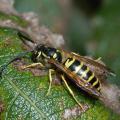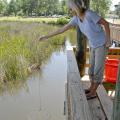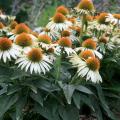News From 2010
MISSISSIPPI STATE – Yellow jackets are most likely to attack in the fall, but these stinging wasps are a year-round threat, especially because they can be hard to detect until they are disturbed.
Yellow jackets are small wasps about 3/8 inch long. Their black and yellow-banded bodies have three segments. Each insect is equipped with a smooth stinger that can sting multiple times. In contrast, a honey bee has a barbed stinger that stays in the wound, limiting the bee to only one sting.
By Alicia Barnes
Southern Rural Development Center
GULFPORT – Forty two Mississippi State University employees have trained and half have reported to the Mississippi Gulf Coast to transport birds and turtles impacted by the Deepwater Horizon oil spill.
In May, Elmo Collum, an Extension associate who coordinates disaster response, received a call from the Mississippi Animal Response Team requesting assistance from MSU’s Extension Service and the Mississippi Agricultural and Forestry Experiment Station.
MISSISSIPPI STATE -- Record-breaking heat is forcing Mississippi producers to manage crops more carefully than normal to bring what looks like successful yields to harvest.
Temperatures in the Delta, which is home to the majority of the state’s row crops, have set as many as five record highs during the first week of August.
Nancy Lopez, a physical scientist with the U.S. Department of Agriculture in Stoneville, said some daily records from Greenville to Vicksburg were broken consecutively in August. July also was unusually hot across most of the state.
MISSISSIPPI STATE – Anyone growing muscadine grapes in Mississippi is invited to attend the Aug. 21 Muscadine Field Day in Pearl River County.
Mississippi State University’s Extension Service and the U.S. Department of Agriculture’s Agricultural Research Service are offering the free event in the vineyard at the McNeil Research Station. The field day begins Saturday at 8:30 a.m. and will feature speakers, tours and samples of the fruit MSU is growing.
I spent last week in Palm Desert, Calif., where the daily temperatures were 110 degrees or more and the humidity was less than 20 percent.
The landscapes I saw there are completely foreign to our lush, green gardens. Yet the landscape was quite beautiful, not bleak as I had imagined. There were lots of flowering desert plants, and I quickly realized that one of the first things I needed to get was a desert plant guide.
MISSISSIPPI STATE -- Chicken and nets may not seem high tech, but a Mississippi State University student finds them necessary tools for researching an important Gulf Coast resource.
MSU College of Forest Resources’ doctoral student Sarah Harrison is collecting data on the blue crab populations in the Pascagoula Estuary. She uses crab nets baited with raw chicken legs to pull the crustaceans from the shallow waters of the estuary. Avoiding their snapping claws, she weighs and measures the crabs before returning them to the water.
By Karen Templeton
MSU Ag Communications
MISSISSIPPI STATE – While many people spent their summer vacations relaxing on the beach, a group of Mississippi State University College of Veterinary Medicine students traveled to Central America to help animals in need.
In June, Katie Cooley, Brolin Evans, Brittany Fisher, Kellie Horton and Stephanie Starling, all second-year CVM students, participated in a Volunteers for Intercultural and Definitive Adventures, or VIDA, veterinary mission trip.
By Karen Templeton
MSU Ag Communications
MISSISSIPPI STATE – Successful planting got Mississippi cotton off to a strong start, and prospects look good for the crop as long as growing conditions and demand remain favorable.
Darrin Dodds, cotton specialist with the Mississippi State University Extension Service, said 2010 has been one of the state’s most successful cotton plantings yet.
“It all went off without a hitch for the most part and wrapped up the first week of June,” Dodds said.
MISSISSIPPI STATE – Weeds that have developed resistance to the commonly used herbicide glyphosate are forcing row crop farmers to change their production methods to battle the problem.
Five weeds found in Mississippi have developed resistance to glyphosate, the active ingredient found in Roundup herbicide. Since 1996, this broad spectrum herbicide has been used extensively as an easy and effective way to control weeds in row crops that have been genetically modified to withstand the chemical.
MISSISSIPPI STATE – Mississippi is one of six states participating in a study monitoring the problem of glyphosate-resistant weeds and trying to prevent any more from developing.
Roundup is the trade name for glyphosate, a powerful broad-spectrum herbicide that can kill a wide range of weeds in varying growth stages. Seed genetically modified to be resistant to glyphosate is known as Roundup Ready seed. With Roundup Ready cropping systems, producers can apply glyphosate across a field, killing weeds but leaving the crop undamaged.
MISSISSIPPI STATE – Mississippi row crop producers are facing a growing problem, as five common weeds have developed resistance to the primary herbicide used to manage them.
Roundup is the trade name for glyphosate, a powerful broad-spectrum herbicide that can kill a wide range of weeds in varying growth stages. But by the 2010 growing season, 19 weeds worldwide had become resistant to glyphosate, and five are found in Mississippi. These weeds are horseweed, Italian ryegrass, Johnsongrass, and Palmer amaranth and waterhemp -- both species of pigweed.
As we enter the most active part of hurricane season, now is a good time to think about ways to help landscape trees recover from storm damage.
A common myth is that the root system mirrors the top growth of a tree. While some trees do put down deep roots, most of a tree’s root system is in the top 12 to 14 inches of soil. Roots need to be near the surface to exchange carbon dioxide and oxygen gases and to ensure healthy root and tree growth. These roots also help stabilize the tree. You can see their presence and arrangement in trees that have been blown over.
BAY ST. LOUIS – An upcoming conference will provide a chance for the rural tourism community to meet the challenges they face in the upcoming months.
Rachael Carter, a community-instituted planning specialist with the Mississippi State University Extension Service, said the Miss-Lou Rural Tourism Association is working hard to bring together those involved in tourism and community and economic development in rural Mississippi and Louisiana to increase tourism in these areas.
MISSISSIPPI STATE -- Therapeutic riding, like other medical treatments, has come a long way in recent decades.
Therapeutic riding is a specialized equine activity that provides physical, emotional and psychological benefits to people with cognitive and physical disabilities.
Anthony Busacca, a master’s level instructor with the North American Riding for the Handicapped Association, has more than 20 years of experience in therapeutic riding. He said the advancements can be seen in every aspect of the therapy.
MISSISSIPPI STATE -- Today’s economy means people are eating out and purchasing meat products less often, but cattle and hog producers have learned to make the most of tough times.
Livestock producers reduce their cattle herd sizes and hog numbers to reduce the amount of meat on the market and bolster the product prices, which remain at the mercy of the economy.
John Michael Riley, a Mississippi State University Extension Service agricultural economist, said producers work hard to keep their product affordable when money is tight.
Deadheading is an important garden maintenance activity, but many gardeners overlook the importance of removing spent flowers.
We deadhead flowering plants to extend the bloom period, to remove the seed source of species that could become weedy and to maintain the health of flowering garden plants.
By Alicia Barnes
For MSU’s Ag Communications
MISSISSIPPI STATE – Until a few weeks ago, Jason Edmonds had not eaten beef in nearly three years.
Citing concerns over animal welfare, his personal impact on the planet, and added hormones and antibiotics, Edmonds adopted a vegetarian lifestyle for years, until finding access to local farmers who share his concerns.
MISSISSIPPI STATE – A Mississippi State University study has confirmed the success of a new technique to reduce nutrients in runoff water and protect downstream waters, including the Gulf of Mexico.
Weirs, also known as check dams, are small dams used to collect water runoff from agricultural fields. Weirs are often the size of a drainage ditch, with a 2-foot channel in the center for water drainage. The weirs are concrete can be moved to various locations in a drainage ditch.
MISSISSIPPI STATE -- Mississippi forage producers are experiencing a major invasion of fall armyworms for the second consecutive year in pastures and hay fields across the state.
Blake Layton, a Mississippi State University Extension Service entomologist, said fall armyworm populations were unusually heavy last year with treatable populations reaching north Mississippi relatively early in the year and eventually extending into Tennessee. In 2010, the southern part of Mississippi needed treatments starting in early June.
What relative of the morning glory makes an ornamental ground cover featuring beautiful, colorful foliage?
If your answer is ornamental sweet potatoes, then you are right. Ornamental sweet potatoes, known botanically as Ipomoea batatas, are actual sweet potatoes selected for their vivid and attractive leaves. The plants produce a flower that resembles a morning glory but is hidden by the foliage. They also produce edible tubers.
Pages
News Types
- Crop Report (423)
- Feature Story (5867)
- Feature Photo (53)
- Extension Outdoors (318)
- Southern Gardening (1446)
- Extension Inbox (95)
Archive
- 2024 (170)
- 2023 (182)
- 2022 (187)
- 2021 (177)
- 2020 (212)
- 2019 (223)
- 2018 (276)
- 2017 (338)
- 2016 (383)
- 2015 (457)
- 2014 (498)
- 2013 (490)
- 2012 (492)
- 2011 (356)
- 2010 (323)
- 2009 (313)
- 2008 (273)
- 2007 (263)
- 2006 (252)
- 2005 (278)
- 2004 (273)
- 2003 (279)
- 2002 (228)
- 2001 (238)
- 2000 (243)
- 1999 (233)
- 1998 (232)
- 1997 (239)
- 1996 (58)
- 1995 (36)











